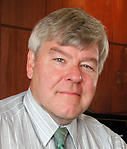The University Senate will elect a secretary of the senate when it meets at 4:30 p.m. April 26 in the Forum Hall of Palmer Commons. The secretary will serve a three-year term, and is charged with maintaining records for U-M’s faculty governance panels and with keeping the minutes of meetings of the Senate Assembly and the Senate Advisory Committee on University Affairs. There are two nominees for the position. Additional nominees may announce their intent to run at the meeting.
• Robert Fraser, associate director, Mardigian Library, UM-Dearborn

Photo courtesy Robert Fraser.
Candidate statement: “Thank you for considering my name for the position of Faculty Senate secretary. I have served on a variety of faculty committees and in
leadership roles on both the Ann Arbor and Dearborn campuses. These include SACUA (including vice chair), Faculty Grievance Monitor, Faculty Senate Assembly, Committee on the Economic Status of the Faculty (including chairing the sub-committee on benefits), the advisory committee to the secretary of the university, the advisory committee to the Office of the General Counsel, the Civil Liberties Board and the Budget Study Committee. On the Dearborn campus, I initiated and chaired the benefits committee, chaired the ITS advisory committee, served on the library advisory committee and the Faculty Senate executive council, among others. This broad experience is important for an understanding of how the university works. For the position of secretary of the Faculty Senate, I offer this philosophy: when the record of a meeting is made, the secretary must be agnostic, be disinterested. There should be no personal or partisan agenda reflected in the minutes. The secretary may offer strategic perspective or guidance on parliamentary practice during a meeting, but never it should be said that the secretary is the most powerful person in a group because she or he is able to shape the record of the meeting. The secretary must be fair to all and must strictly maintain appropriate confidentiality. The position of a secretary is also as a non-voting member of SACUA; there is wisdom in ensuring that the secretary of SACUA not be a voting member of that body, even if it avoids the perception of a conflict of interest. My willingness to be considered lies solely in the opportunity to serve with impartiality and disinterest the faculty of the University of Michigan.”
• John Lehman, professor of ecology and evolutionary biology, LSA

Photo courtesy John Lehman.
Candidate statement: “Serving you as senate secretary is an honor and a serious responsibility. The senate is composed mainly of the tenured and tenure-track faculty, and we have an important role in the leadership of our great university. The senate’s administration evaluation process (aec.umich.edu), overseen by the secretary, provides effective and regular faculty feedback about university affairs. Academic administrators find it useful, and each year administrators not originally identified by the senate ask that they now be included. Next year, UM-Flint will join Ann Arbor and Dearborn in the annual evaluation. With coordination among dedicated faculty volunteers, the process has worked smoothly since 2004.
“During the past three years, I’ve worked successfully with administration and faculty, achieving reform of faculty grievance procedures and developing the Statement on Academic Freedom (www.umich.edu/~sacua/SenAssb/01-25-10academicfreedom.pdf) now listed in the Faculty Handbook. I initiated an online archive and index to both SACUA and Senate Assembly minutes to allow convenient access to past actions and precedents of faculty governance. The secretary also receives resolutions for action at senate meetings, and administers votes by mail. In February the AEC system was used to elect your representative to the DPS Oversight Committee, a model for future plebiscites that can poll the full senate, if the senate so decrees.
“I see my role as working for you and your elected representatives to promote improved participation in elected faculty governance, transparency in university affairs and governance actions, and effective communications with student governance.
“As we face emerging challenges, I pledge to keep you informed and help your voices be heard.”

